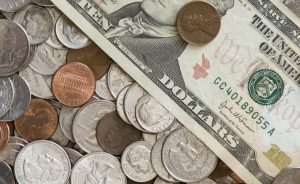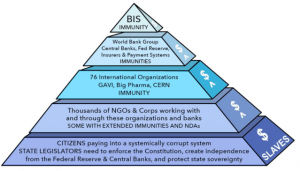The Smart Money Nightmare: What Life Without Cash Could Mean for You
It is vital that every person understands what the proposed changes to the monetary system will mean. The changes, if allowed to happen, could be the most devastating event in our lifetime and potentially the biggest removal of liberty in modern history.

Richard Hall of Rich Planet TV has produced the video below explaining the dangers of smart money, central bank digital currency (“CBDC”) and removing cash. Everyone needs to watch this video. It needs to be shared widely, particularly with those who think blockchain is “private” and will “beat” the system and with younger generations who think cash is or should be made obsolete.
Richard Hall: Johnny’s Cash and The Smart Money Nightmare, 4 October 2022 (15 mins)
If the video above is removed from YouTube you can watch it on Bitchute HERE.
What better way to shift the world towards the changes required for the “smart money nightmare” to take effect than a crisis or a series of crises. Could recent interventions by the Bank of England be an indication of such a crisis? We don’t know and we don’t know if it is all happening by design and planned well in advance. But we do know they would “never let a good crisis go to waste.” So recent and significant disturbances in the financial markets are worth noting.
Bank of England Intervenes to Smooth the Market
The British government’s shift toward fiscal stimulus – a plan unveiled by UK Chancellor Kwasi Kwarteng – upended British financial markets. The combination of massive energy subsidies and tax cuts alarmed investors, who worried that the British budget deficit would become unsustainable. The result was a very sharp rise in bond yields, a decline in equity prices, and a historic drop in the value of the pound.
In a scathing verdict on the UK’s plans, the IMF urged Kwarteng to “re-evaluate” the tax-cutting plan, which includes the scrapping of the top rate of income tax and an end to a bonus cap for bankers, saying it will “likely increase inequality.” It urged the UK government to “provide support that is more targeted and re-evaluate the tax measures” during the chancellor’s upcoming announcement.
Shortly after the IMF statement, credit rating agency Moody’s released its own damning verdict, saying the fiscal plan could threaten the country’s credibility with lenders by creating larger budget deficits.
When a government wants to raise money to pay for its spending programme, one tactic is to issue bonds. In the UK, government bonds are called “gilts.” When the UK government issues gilts, it borrows money from the buyer. The loan term may be a few months, or it could extend to several decades. Bondholders receive an interest payment during the bond’s life and get back their capital when it matures. The interest rate is also known as “yield.” Today’s bond markets are worth around £100 trillion worldwide, according to the Securities Industry and Financial Markets Association. Every three months the UK’s Debt Management Office (“DMO”) publishes a Quarterly Review summarising its gilt and money markets operations over the given quarter. The latest Quarterly Review is for April – June 2022. It shows that in the first quarter of 2022 (April -June), 27.5% of the UK government debt was held by insurance companies and pension funds.

United Kingdom Debt Management Office: Quarterly Review April – June 2022, pg. 3
On 26 September the Bank of England made a statement that it was monitoring developments in financial markets very closely. In a further announcement on 28 September, the Bank of England (“BoE”) said it was taking measures – carrying out temporary purchases of long-dated UK government bonds – to restore orderly market conditions.
Sky News: Bank of England takes emergency action to calm markets, 28 September 2022 (6 mins)
Capital Economics said that the BoE’s steps show “it is going to do all it can to prevent a financial crisis” but that UK markets are “in a perilous position. It wouldn’t be a huge surprise if another problem in the financial markets popped up before long.”
Pound Sterling Live wrote that numerous reports suggested the BoE action was taken after UK pension funds were said to be in distress following sharp moves in yields in the gilt markets.
The US market is sensitive to and has been affected by the UK market, Adam Tooze wrote. It raises the question of the overall fragility of global debt markets. At the end of September tremors were running through euro government bond markets including the German Bund market. “The spasm in the UK market rippled around the world. The EU felt the impact. And so too did the US. As one market participant observed: ‘At the start of the week we were seeing moves in US Treasuries that could only be explained by what was happening in the UK’.”
Professor Richard A. Werner commented on his Telegram channel:
“To fight the collapse of the pound, which is due to the excessive money printing since March 2020 (which is done via bond purchases), the Bank of England has announced more bond purchases – more money printing, copying the failed [European Central Bank] ECB playbook.
Coming soon … UK to agree to peg its currency to the US dollar, at a bargain rate of £1 = $1.
Then all eyes on when ECB & Swiss National Bank will follow (= €1). Eurozone countries have no say here, as they gave up monetary sovereignty to a foreign agency not accountable to any parliament.” – Prof. Richard A. Werner on Telegram
Is the Bank of England Working in Isolation?
According to Tooze, far more nakedly than in 2020, the BoE’s hurried interventions in September 2022 have exposed the forces that truly propel central bank intervention in the current dispensation. “The policy of asset purchases may look like … a coordination of monetary with fiscal policy. They may look like impressive demonstrations of the power of central banks. But they are, in fact, crisis-driven defensive reactions to the spasms of leveraged, market-based finance. What is at stake is not fiscal dominance – the central bank following the lead of the elected government – but financial dominance.”
Corey Lynn notes that BoE is one of 63 members of the Bank for International Settlements (“BIS”):
“A band of criminals got together a century ago and decided they were going to own the world, hold all of the power, create and hoard all of the money, and keep everyone on a constant spin cycle to fool them. Not only were they going to construct it as they saw fit, but they were going to build the most elaborate enslavement system this world has ever seen – one that gives them full immunity, allows them to operate outside the law entirely, and they were going to do it without anyone realising it until it was too late.
At the top of the ivory tower, sit BIS, the Bank for International Settlements, with sovereign immunity. When carrying out specific activities under BIS, this immunity extends to its members, which is made up of 63 global central banks and monetary authorities, the Federal Reserve System, plus insurers, and payment systems through their subsidiary, that BIS deems ‘systemically important institutions.’
These are groups of men and women who masterminded a plan to take global control of the world’s money and weaponise it against everyone. The plotting began a century ago, and it’s far past time to foil their plan.” – Laundering with Immunity: The Control Framework – Part 1, Corey Lynn, 29 September 2022

The Bank of England’s Intervention as Part of a Much Larger Picture
Around the world, financial markets look increasingly distressed, The Economist reported:
“In Britain government-bond yields have surged and sterling has slumped, prompting the Treasury and Bank of England to issue statements attempting to soothe markets. In Japan the government has intervened in foreign-exchange markets to stem the fall in the yen for the first time since 1998. In China the central bank has increased reserve requirements for foreign-exchange trading, in a bid to restrain currency outflows. At the heart of the turmoil is the relentless rise of the American dollar and global interest rates. There is little relief on the horizon.” – Financial markets enter a dangerous new phase, The Economist, 26 September 2022
In a clip from Catherine Austin Fitts’ The Solari Report, John Titus briefly discusses The Economist’s article and what the implications are for the world.
Financial markets enter a dangerous new phase, Catherine Austin Fitts & John Titus, 7 October 2022 (2 mins)
yogaesoteric
December 19, 2022
